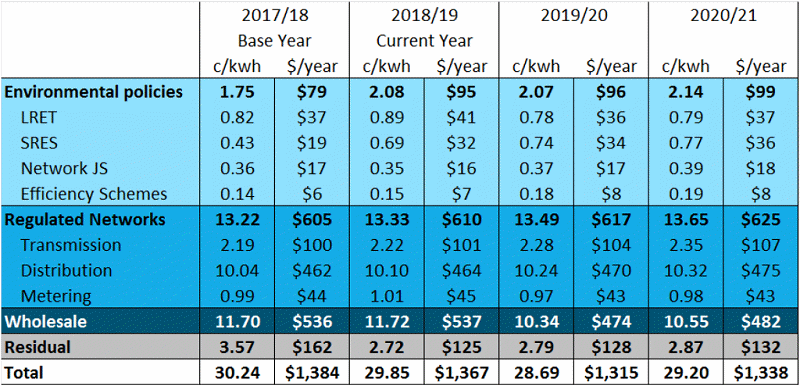
Image: Chris Chow
In a report released on Friday, the Australian Competition and Consumer Commission has repeated its earlier recommendation that Australia’s major solar subsidy should be prematurely ended.
Last year the ACCC called for the Small-scale Renewable Energy Scheme (SRES) to be wound down and abolished by 2021 – and its advice hasn’t changed.
“We reiterate this, given the scheme is expected to cost the average residential customer in the NEM $36 in 2020–21,” states the Monitoring of supply in the National Electricity Market report. “The ACCC believes that the subsidy of small-scale installations is no longer required given the dramatic fall in the cost of solar installations since the inception of the scheme in 2011.”
The ACCC says the $36 figure is from an Australian Energy Market Commission (AEMC) report from December last year – The 2018 Residential Electricity Price Trends Review – Final Report. That figure is mentioned on page 59 of the AEMC report and is based on an annual electricity bill of $1,338. Costs relating to the SRES work out to around 2.6% of that total. It’s more than it has been, but still very much a bit player.
The ACCC acknowledges further into its own report that the subsidy (aka the “solar rebate“1) is already being phased out – the level of subsidy will drop each year before it ends in 2030.
“This will lead to the ongoing costs of the scheme reducing relatively slowly over time for future installations.” (page 89.)
Regardless, ACCC Chair Rod Sims is sticking to his guns.
“It’s become economic for many households to install solar panels, so there’s no reason why other users should subsidise this,” he said.
But the SRES provides good value – and it doesn’t just benefit those who have systems. It’s helped to rein in wholesale electricity prices (which benefits everyone), decreased electricity generation related emissions and created jobs. The subsidy assists battler families to slash their electricity costs through installing solar power systems – and without it, they may miss out on that opportunity. The “many” Mr. Sims refers to wouldn’t be as many if the subsidy was axed now.
SQ’s Ronald went into more detail on why the ACCC’s original recommendation was/is bad here – The ACCC Wants To Lower Electricity Prices Even If It Kills You
Will The Solar Subsidy Be Axed?
While axing the subsidy may be vigorously supported by some politicians, both Labor and the Coalition Government have said they’ll let it run its course.
In October last year, Energy Minister Angus Taylor said there was “no plan” to change the SRES – and he’s sticking to that story according to this article on the Sydney Morning Herald.
“We know the real cause of price rises in recent years has been the actions of the big energy companies,” Minister Taylor said. “The SRES will gradually phase out between now and 2030, as renewables continue to become more cost competitive.”
Solar power is incredibly popular in Australia, so for a party to float the idea of killing off the subsidy with an election just around the corner would not be a wise move. Post-election? All bets are off, but it seems whipping electricity companies will remain the focus for a while yet.
Footnotes
- The solar subsidy/rebate shouldn’t be confused with feed in tariffs – they are different beasties. ↩


 RSS - Posts
RSS - Posts



Is it any wonder these government quangos like the ACCC, APRA, ASIC etc have zero credibility with the public. They get paid hundreds of millions of dollars to do what exactly. Make sure the average Joe can continue to be screwed by the vested interests in the “big end of town” and yet when wrong doing by these companies is staring them in the face they turn to water..
In all honesty (and maybe I should post this tomorrow…), I don’t think removing subsidies would be such a terrible thing. It’s true that solar prices have dropped tremendously over the last 10+ years, and demonstrating that the business can still flourish without subsidies might kick out one more crutch from our dwindling cohort of critics.
And if you want any proof that the landscape really has changed… cast your mind back a mere 2-3 years and imagine a Liberal energy minister blaming the big energy companies (and NOT renewables) for high electricity prices!
The industry is in a pretty good space at the moment. Provided we don’t put all of our installers out of business with malicious bureaucracy…
If there wasn’t an Election in the offing and the LNP wasn’t so on the nose, then I think that the landscape would not have changed.
Your final point is a powerful one, thumbs up.
If the installer did not have to apply for the SRES rebate, and simply had to make the installation compliant with the electric codes. I would imagine this might reduce costs and increase competition.
So maybe we are approaching to the stage where removing the rebate would not increase the install cost much.
I’d be OK with removing subsidies provided pollution was correctly priced.
Remove the diesel rebate scheme and I’ll happily support removal of all renewable subsidies.
Those saying axing wouldn’t be a bad thing don’t seem to realise how generous the scheme is. Basically you pay almost nothing for the panels themselves. Go and have a look at how expensive a 6kW system is in the US (even with tax credits) and you may change your mind.
And meanwhile……. ‘Victorian coal plants producing highest mercury pollution in the country, report shows’ – according to a rather dramatically headed article published on the ABC just a few hours ago at this link: [ https://www.abc.net.au/news/science/2019-04-01/coal-fired-power-emissions-mercury/10958128 ].
The same article has some useful statistics concerning the impact of pollution generally on public health, and the consequential additional medical costs that then need to be paid for by consumers and government.
Government ‘promises’ about lower electricity prices don’t seem to have achieved much… in fact, a one-off ‘cash subsidy’ to less well-off households has just been increased, in recognition of the fact that we now have some 30% of Australian households whose income level is below the poverty line, and increased electricity costs are a very significant item in their budget.
I’m somewhat ambivalent about the axing of the SRES subsidy. On the one hand it is true that the costs of solar systems have reduced significantly, and you now get a quite acceptable ROI in the order of 16 – 17% on your ‘investment’ without any SRES subsidy.
But axing it overnight would be highly disruptive to the solar industry and its employees in general in the short term (say for a year or so at least), and would occur right at a time when there are lots of other economic ‘shocks’ around adversely affecting other industries.
But leaving that aside, those sitting on the fence and still ‘thinking about’ getting solar would be wise to make their minds up NOW in my opinion. The ‘probability’ of SRES subsidies being either reduced, scrapped, or phased out more quickly does seem to have risen significantly (for various reasons). As well, the days of ‘steep declines’ in solar PV roof-top systems seem to be well and truly over.
and the gentailers pay you ~8c/kWh for your surplus and charge the house next door 20-30c for it. How about ACCC gets rid of that transmission arbitrage subsidy at the same time? Solar panel buyers aren’t really the ones being subsidised, but they’ll be the ones being ripped off when it goes.
I read somewhere, several months ago that the ACCC doesn’t have to take the National Interest into account with its investigations and findings.
I accepted that at face value, mainly because I couldn’t be bothered trawling through the ACCC site looking for appropriate stuff.
If anyone with lots more knowledge on this aspect can confirm of deny that, I am more than happy to sit back smugly, or change my viewpoint.
The scheme is one idea/way to encourage renewables however there are pros and cons
1. It really isn’t aimed at those that need the relief from high power prices i.e. low income families. In effect it is a scheme that provides taxpayer funds to high income households who can afford the initial costs of installing these systems. It could be better targeted depending our ideas of social equality/fairness.
2. The other problem with with this scheme from my limited understanding is that you can install the panels in your basement and still get the rebate. In some USA states I believe there is minimum efficiency requirement for the installation that must be meet before any tax paying dollars are handed out.
3. The money being spent (private and public) is probably better directed into large solar farm systems with full tracking that are better located and integrated in the power network. This should result in optimised high efficiency systems. Not sure about the statistics on this but the number of home installs I have personally observed on permanently shaded roof tops (sydney) is ridiculous – might was well have installed them in the basement! There of course are public awareness and participation benefit aspects as well. I would be interesting to understand where the real drivers behind home installations are currently coming i.e. concerns about the environment, power prices or sticking it the power companies? These drivers will probably be socioeconomically dependent.